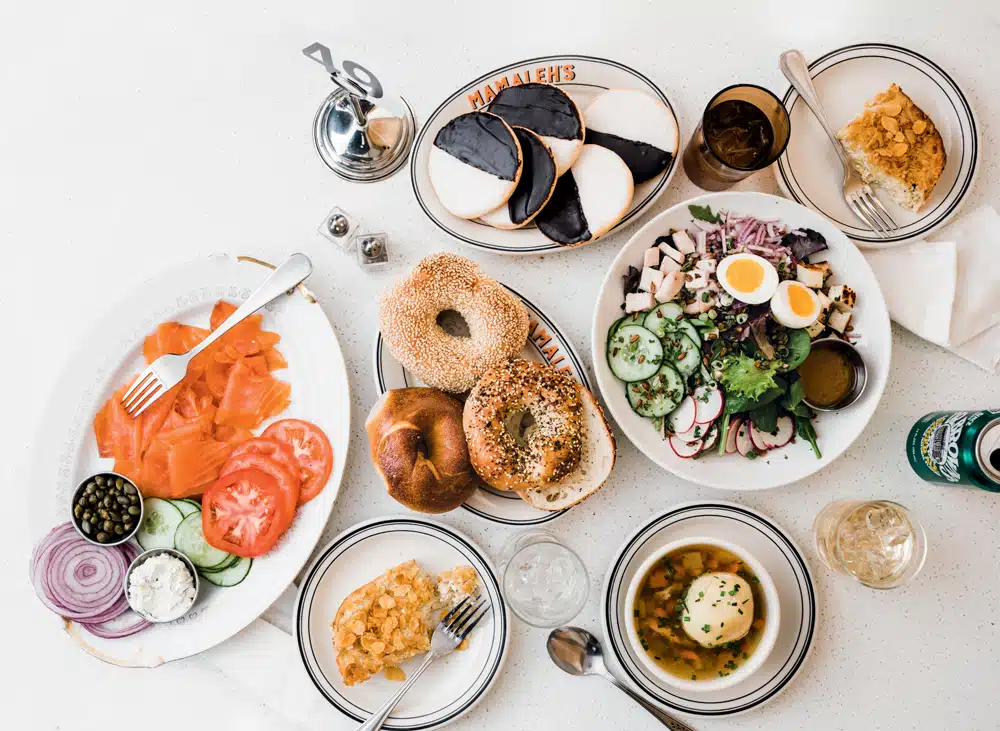Long Live the Deli | Recipes from Mamaleh’s Deli in Cambridge, Massachusetts
From noodle kugel to homemade matzo ball soup, Mamaleh’s Deli in Cambridge, Massachusetts, offers lessons on a Jewish food revival.

Long Live the Deli
Photo Credit: Michael Piazza | Styling by Catrine Kelty
Photo Credit : Michael Piazza | Styling by Catrine Kelty

Photo Credit : Michael Piazza | Styling by Catrine Kelty
The classic Jewish deli is an American creation with deep roots in Eastern Europe. There, a combination of poverty, climate, and religious laws gave rise to a cuisine based on preserved meats and fish, poultry (and its rendered fat, or schmaltz), bread, and root vegetables. Between 1890 and 1920, more than two million Jews fled poverty and persecution by coming to America. On New York’s Lower East Side, the culinary traditions of Poles, Russians, Romanians, and Germans met and melded and were, in turn, shaped by the emergence of the American lunch counter.
Deli food was always labor-intensive and humble. Bagels and pastrami take days to produce, but no one expects to pay much for them. That may have worked in a turn-of-the-century economy, but as Jews assimilated and deli owners found themselves without a next generation to take over, New York’s count of kosher delis dropped. This history is chronicled in David Sax’s book, Save the Deli. “Today, there are but a few Jewish delis scattered around,” he wrote in 2009. “In 50 years’ time, it is possible that no delis will exist in all of New York City.”
Downstairs from Mamaleh’s main dining room, co-owners Rachel Sundet, a pastry chef, and Rachel Miller Munzer, the team’s chief restaurant officer, are mulling this possibility. Before opening Mamaleh’s, Miller Munzer and her husband, Alon, had long nurtured the idea. Then Alon read Save the Deli, which lit a fire under their plans. Both Rachels are Jewish, with school-age children and a sense of urgency about passing traditions on to the next generation.

Photo Credit : Michael Piazza | Styling by Catrine Kelty
“I worry about it,” Miller Munzer says. “I feel a strong responsibility. There’s a generation between ours and our kids’ that is having to relearn all this.” And yet since Save the Deli came out, the genre has seen a real, if modest revival. In the Boston area, there’s Mamaleh’s, Michael’s, Zaftigs, S&S, and Our Fathers. Bagel bakeries like Bagelsaurus, Exodus, and Levend are thriving. In Portland, there’s Rose Foods and BenReuben’s Knishery.

Photo Credit : Michael Piazza | Styling by Catrine Kelty
When Mamaleh’s opened, everything was made in-house: the corned beef, the bagels, the lox. Knishes were fresh and served hot. Tri-generational families gathered for blintzes. The restaurant was winning awards, but losing money. And in 2020, Covid forced Mamaleh’s to shut down for a time, then pivot to takeout service with a smaller menu. In that sobering moment, the team found an unexpected solution to the deli dilemma. Switching to takeout and streamlining the menu created economies of scale. To save the deli, they learned, they had to serve casual, humble food in a casual, humble way.

Photo Credit : Michael Piazza | Styling by Catrine Kelty
Now, the bagels are still made in-house, but the smoked meats are produced off-site using Mamaleh’s recipes. Table service may be gone, but Sundet says she still sees families gathered together on weekends.
“It’s been challenging,” she says. “In our perfect world, we would have everything on the menu. But we had to make decisions that would work for the business.”

Photo Credit : Michael Piazza | Styling by Catrine Kelty
In Save the Deli, Sax spoke with the late sociologist William Helmreich about why the deli still matters. “Younger Jews who go into delis are practicing something us sociologists call ‘symbolic ethnicity,’” Helmreich said. “When the real trappings of ethnicity are gone—language, religion, practices—by the third or fourth generation people look for symbolic ways to identify, and food is the easiest.”
Miller Munzer agrees. “I think really what keeps us going, as hokey as it sounds, is that we’re making those memories. We see people who get up on Saturday morning and come with their kids. And those kids are going to remember that as part of their childhood.”
Like original delis in turn-of-the-century New York, the kitchen of Mamaleh’s is staffed with a team of recent immigrants, now mostly women from Central America. The close-knit crew is made up of several sets of cousins, sisters, and aunts. “It’s a ladder system,” Sundet says. “As soon as they can start moving up, they bring in new people and start teaching them.” The Jews on staff, in turn, share the stories behind the food.
“So much of Judaism is about storytelling,” Sundet says. “And those stories are connected to the meal. So we’re telling the story of Hanukkah and why we eat food cooked in oil. And our incredible staff is like, ‘Oh, OK. That helps to explain why we’re cooking one million potato latkes!’” And so the tradition continues on.









I wish the owners great success, but would like to offer a comment on delis in general. New York has inferior delicatessens. You read that right; they do, but you should ask, “Inferior to what?” The answer is “inferior to the Midwest”, where corned beef is fattier and more flavorful, and where the water makes the rye bread (no caraway seeds, please) soft inside and appropriately crunchy on the outside. Everything else is also just, well, better. The northern tier from Buffalo, Cleveland, Detroit, Chicago, and Minneapolis have far superior delis to those in New York. New Yorkers may brag, but the Midwest has the goods!
You might enjoy reading the book “Save the Deli,” which profiles several midwestern deli owners!
Ah, but the fish, and the bagels? And the people? The yidishkeyt? The institutional memories? I grew up in the Midwest, and there is great Jewish food there, much of it cooked at home. I learned from my bubbe from Odesa. We have now got a great deli springing up in Bryan , Texas. New England and New York are holding their own — rent challenges notwithstanding: I have lived there, too, and great Jewish food is to be had in great Jewish delis and appetizer stores. Let’s keep the tradition alive wherever we are. Est gezint, everyone!
As I always say…..It is all about Family, Tradition and Food!! Who are we without it??? Much Good Luck with your Deli Revival!!